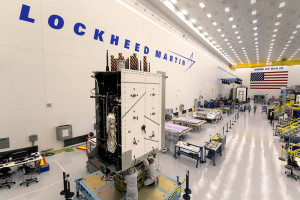The Air Force’s first on-orbit GPS III satellite successfully connected to its upgraded Contingency Operations Program (COps) Oct. 21, said the service and program contractor Lockheed Martin [LMT].
The COps system, which was delivered to the Air Force in May, allows the service to operationally command and control its new GPS III satellites as they come online, along with legacy GPS satellites currently in the constellation, said the Air Force’s Space and Missile Systems Center in an Oct. 22 press release.

The Contingency Operations program is one in a series of upgrades to GPS III systems that will allow the Air Force to control and operate the advanced satellites while it awaits delivery of the Next-Generation GPS III Operational Control Segment (OCX) in development by Raytheon [RTN].
The Air Force is currently operating Block 0 of OCX to launch the new GPS III satellites, and service officials told reporters last December that Block 1 is expected to be fielded by 2021 or 2022, over five years behind schedule (Defense Daily, Dec. 14, 2018). The Air Force contracted with Lockheed Martin in 2016 to build the OCX COps update in the meantime.
After final system tests were completed this past June, the Air Force approved the installation of COps to command-and-control legacy operations at the Master Control Station at Schriever Air Force Base, Colorado, and at the Alternate Master Control Station at Vandenberg AFB, California.
Then, in October, the COps program received approval from Air Force Space Command’s Operations and Communications Directorate to enter a trial period, the Air Force said. That included testing COps command and control with the live, on-orbit GPS III satellite, to confirm readiness for operational acceptance targeted for December 2019 and April 2020 for the GPS III satellite and COps, respectively.
The Air Force has launched two out of a planned 10 satellites in the initial GPS III program. The service accepted the third space vehicle for delivery in May and is currently tracking January 2020 for launch. Lockheed Martin also received a $1.4 billion contract last fall to develop Space Vehicles 11 and 12 under what is known as the GPS III Follow-On program.